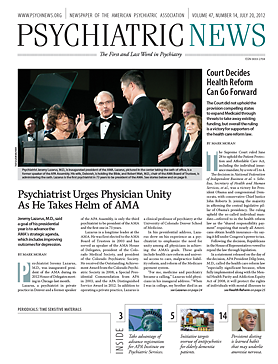Meeting military patients with posttraumatic stress disorder (PTSD) where they are is not simply a mantra for U.S. Army research psychiatrist Maj. Gary Wynn of the Center for Military Psychiatry and Neuroscience at Walter Reed Army Institute of Research.
They have plenty of other reasons to visit a doctor, he told listeners at APA’s annual meeting in Philadelphia in May.
“There’s a lot of physicality associated with the etiology of PTSD, which is why soldiers with these symptoms are showing up in primary care clinics.”
Wynn cited studies showing that troops with PTSD symptoms and no head injury have more postconcussion symptoms than people with head injuries and no PTSD.
“If they endorse these physical symptoms, they’re just going to cycle within the family medicine or internal medicine clinics, but won’t get identified as having PTSD and won’t get the treatment they need,” he said.
However, connecting those general medical problems is also a key to establishing collaborative-care arrangements between primary care clinicians and mental health clinicians to identify and treat reactions to combat such as PTSD.
Stigma remains a stubborn problem in the military services. Fewer than 50 percent of those who need mental health care get it, and 20 percent to 40 percent of those who do show up for treatment don’t complete it.
The most common reasons given for avoiding care, say troops, is that they “don’t trust mental health professionals.” They also feel that if they ignore their problems they will go away, or they see mental health care as a last resort. Even as they rejected evidence-based mental health care, many of these same individuals were spending their money on unproven supplements or other alternative remedies.
“We need to understand negative perceptions of mental health and why patients drop out of treatment,” said Wynn. “Then we have to do a better job of letting people know about mental health care.”
Ultimately, retention in treatment is the best strategy to improve outcomes, since completion of a course of treatment is a strong indicator of efficacy. “Given the relative equivalence of treatment options, the focus should primarily be on improving engagement and the willingness to remain in care,” he said.
Practice Guidelines Valuable for Clinicians
Clinical practice guidelines can help clinicians provide better care by evaluating the best available research. However, putting guidelines to use in day-to-day practice isn’t easy, said Col. David Benedek, M.D., a professor and deputy chair of psychiatry at the Uniformed Services University of the Health Sciences in Bethesda, Md., at the meeting.
For one thing, there are several sets of guidelines, issued by different organizations, and they don’t always agree, said Benedek. Also, most of those guidelines lumped together clinical trials among civilian and military populations.
“The Institute of Medicine said there was poor evidence for the value of SSRIs in treating postcombat PTSD, but there’s good evidence that they do help people with noncombat PTSD,” said Benedek.
Nevertheless, existing guidelines still say that patients diagnosed with PTSD should be offered a choice of evidence-based psychotherapy or an SSRI.
“The evidence for using SSRIs may not be as great as for psychotherapy, but they can help with comorbid symptoms,” he said in an interview. “Also, we must work within what patients will accept, and some are not amenable to psychotherapy and prefer medications.”
In war zones, management of acute posttraumatic stress (less than four days after trauma) calls for a conservative approach, he said. Medication is unneeded during that short period, as are psychological debriefing and formal psychotherapy. Sleep problems, pain, and irritability should be addressed close to the front.
“Avoid benzodiazepines because they worsen or increase the risk of symptoms and can have withdrawal problems,” said Benedek.
Military Using Electronic Medical Systems
Once guidelines have been selected, it’s necessary to get them into the hands of clinicians. The departments of Veterans Affairs and Defense issued combined guidelines in 2010 and 2011. Air Force psychiatrist Lt. Col. Charles Motsinger is part of a group working to modify the military electronic health records system and bring them to the point of care in the primary care setting.
The first part of their approach uses office staff to screen patients when they check in. That information goes into the health record and is immediately available to the physician on a computer located in the examining room. The doctor can then ask more detailed, less structured questions in narrative form. The computer program also provides recommendations for treatment and follow-up, and physicians can also add elaborated narrative observations and recommendations for care.
Pilot versions of this new approach are being tested at Ft. Belvoir, Va., and will be implemented soon in Air Force medical settings, said Motsinger.


